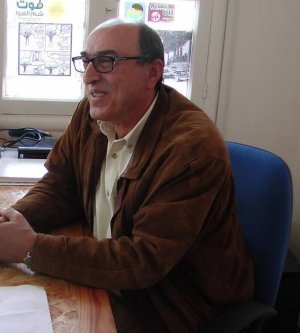We Steal or You Get Buried in Garbage: The Ideological War Against Alternative Solutions to Lebanon’s Garbage Crisis

An interview with environmental expert Naji Kodeih conducted by Myriam Mehanna and Samer Ghamroun
The current garbage disaster in Lebanon is a logical consequence of systematic policies that successive governments have employed since the 1990s. Chaos and neglect did not bury the country in trash; rather, it was a philosophy of governance with clearly defined features and goals that turned garbage from an issue that can be addressed in productive ways, into a dangerous and terrifying bogeyman that the people must escape at any cost and by any means (i.e., the cost and means that suit the political leader’s [za’im] interests). For twenty years, Lebanese authorities have waged a political and intellectual war against all of the alternative and sustainable environmental solutions that many experts have proposed so that two solutions –burying and burning– prevail. In addition to their costly effect on the environment and public health, these two solutions have, in contravention of the law, allowed private companies owned by or affiliated with top politicians to impose exorbitant prices on the Lebanese people. Thus, the key figures of the post-Taif governments have practiced “governance via extortion” on the Lebanese people. In an interview with The Legal Agenda, environmental expert Naji Kodeih dissected this form of governance in order to explain the course of the state’s policies on garbage.
Forging a Crisis, Terrifying the People, and Imposing Specific Solutions
Kodeih summarizes the government’s approach to the issue as terrorizing the people with a conjured-up monster called ‘garbage’, to force them to blindly agree to dubious solutions that the government itself proposes and imposes under the pressure of the disastrous danger that it essentially created. Post-Taif politicians have excelled at practicing this vile method of governance and public policy in a manner that suspends reason, shuts down critical awareness, and precludes public discussion and the development of better, alternative solutions. Kodeih illustrates the hallmarks of a confrontation between two contradictory approaches that have existed in Lebanon for two decades. In the face of the sustainable and productive solutions that Kodeih and his colleagues have proposed (discussed below), the government and its experts have continued viewing garbage as a “unified, inseparable mass of materials that must be disposed of”. This approach broadly facilitates “the logic of garbage dumps”, which have proliferated across Lebanon since the civil war (e.g., those in the areas of Normandy and Bourj Hammoud).
Kodeih explains the financial benefits that top politicians [zu’ama] reap from this act of political deception (from contracts with private companies, to land reclamations using the dumps and creating new investment areas). He takes us back to the recent past to uncover the roots of the current crisis. In 1997, the closure of the Normandy and Bourj Hammoud landfills and suspension of the Amroussieh incinerator (which never worked according to specifications), caused a crisis similar to the crisis today: “The sight of garbage piling up in the streets of Beirut is not new. The post-war governments have previously used it to pressure the people into accepting ready-made solutions without discussion or study of other options”.
In recounting the July 1997 experience, Kodeih discusses another hallmark of the state’s policies: officially agreeing to positive steps, and then working to thwart them on the ground. Thus, the state simultaneously protects the decision makers’ interests and destroys the credibility of the adopted solutions, imposing a return to the solutions of burying and blindly burning. He explains how the Ministry of Environment at the time prepared an emergency plan that was “acceptable” in theory as it centered on sorting at the source, recycling, and composting. The leftover waste (15-20%) was to be buried in a sanitary landfill (Naameh). The government’s method of dealing with this issue in the 1990s sheds light on its method of dealing with it today: “They publically accept and avow good principles and technologies and officially adopt them. But as time passes, what is actually implemented bares no resemblance to the plan that was adopted”. This is exactly what occurred in 1997. From day one it began to appear that the composting and sorting facilities that the plan called for would never be built, which meant that the absorptive capacity of sorting and fermenting remained limited to the Coral and Katerina facilities, and later the Amroussieh facility, and as such fell far short of the plan’s goals.
Similarly, the Naameh landfill, which was designed to accept the leftover 20% of garbage after sorting and composting, began indiscriminately accepting around 80 or 90% of garbage because of a lack of seriousness in the sorting process. This caused the landfill to rapidly and arbitrarily expand such that, as the years passed, it grew to be multiple times its planned size and area.
Kodieh points to another example of the lack of seriousness with which the governments implemented the sorting policy. These are the trucks that the garbage collecting company, Sukleen, uses to collect and transport garbage which mix and compress the garbage in a manner that makes subsequent sorting impossible. He stresses that the government strives to thwart the policies and alternative ideas even when it adopts them on paper: ideological warfare against the other options is essential for imposing landfills as the sole solution. The limited manual sorting that was actually implemented following the adoption of the 1997 plan fell short of the acceptable standard, producing compost that no one wanted to use even when offered for free (note that Lebanon imports compost from distant countries like Holland). All of these factors together turn garbage into a single, terrifying mass that must be disposed of by burying and burning it at ridiculously high prices that dwarf those adopted worldwide, and at a great environmental, health, and financial cost. Through these mechanisms of governance, the garbage issue became a goose that lays golden eggs for politicians, which explains why they cling today to policies that have failed economically and environmentally, and have fallen out of favor with the population.
Chehayeb’s Plan: A Masked Return to Quota Politics?
To Kodeih and others, the causes of the July 2015 crisis are clear: the previous system of managing garbage and its profits, a system tied via Sukleen to the interests of a single leader, could not satisfy the financial aspirations of the other leaders. The January 2015 decree broke the monopoly on profits and distributed them among all Lebanese leaders using the logic of “to each Lebanese region its own Sukleen-like company”. Kodeih describes the climate of the political and ministerial debates that occurred at the beginning of 2015 as “shameless”, because the “mania” of divvying up Lebanon’s regions and hence the profits to be made from treating their garbage at very high costs, totally precluded consideration for other strategic environmental solutions. This mania is manifested in the terms of reference document that gave a recognized role to the political forces in each region. The current phase, according to Kodeih, bears the same hallmarks that we saw in the 1990s: the extortion of the people through leaving garbage in the streets, followed by the imposition of solutions with prices and conditions dictated by the crisis. This approach was reflected in the carelessness of officials during the first days and weeks of the problem: the Council of Ministers delayed addressing it while garbage piled up in residential neighbourhoods.
Our discussion with Kodieh turns to the recent decisions taken by the Council of Ministers, which centered on Minister of Agriculture Akram Chehayeb’s plan. Kodeih asks, “Is it a qualitative shift away from the policies of the past towards something better? Or is it an extension of those policies with the addition of some embellishments?” The positive aspects of the plan are that it officially acknowledged the failure and corruption of the previous policies, and that it transferred waste management from centralized administration to decentralized administration by re-acknowledging the role of the municipalities (stipulated originally in the 1977 Law of Municipalities).
However, Kodieh highlights the many worrisome aspects of the plan and the Council of Minister’s decisions. The interim plan that was approved is not in any shape or form a step on the path towards a long term solution: “The interim solution is totally independent from the final solution, and that’s a bad sign. The interim [solution] does not prepare for the final [solution] and is therefore liable to continue”. Similarly, the plan does not take into account lessons learnt from the previous policies; it once again prioritizes burying, even though landfills are expensive to build, maintain, and track scientifically, and therefore causes enormous financial wastage in addition to health and environmental concerns. “Does it make sense for us to build costly facilities like landfills that require expensive tracking for dozens of years, in order to dispose of organic material (which constitutes the bulk of Lebanese people’s garbage)?”
Similarly, the plan does not state what will be done with the garbage (before and after it is sorted), nor does it talk about specific methods of treatment or final disposal. This will allow companies to step in later and determine the standards and methods employed based on their interests and the interests of their political sponsors. Additionally, in the sustainable phase, the municipalities’ role is restricted to sorting, recycling, sweeping, collecting, and transporting rubbish – powers already observed in existing law. In other words, the government ‘gifted’ the municipalities powers that they should already have. Regarding the treatment of the garbage, the plan dictated that the service areas upon which work will be based must be large enough to produce at least 200 tons of garbage, which equates to the waste of 300,000 people. Hence, these areas are vast and beyond the administerial capabilities of the municipalities, even if they united. This once again paves the way for tender bidding and for private companies to step in. “They gave the municipalities the role of garbage man and opened the door to the companies to reap the profits. In other words, we’ve come in a circle.”
The Acceptable Solution: A New Approach That Turns Garbage into a Resource
What about the solution? “They’re blowing it out of proportion”, says Kodeih, referring to the authorities’ use of scaremongering to impose solutions that suit their own interests. But the solution requires an alternative philosophy for approaching the problem, the philosophy of “trusting the people”. Kodeih criticizes the logic that says the Lebanese people are not prepared to sort. It is a logic he heard used by ministers in the 1990s. It is a logic that he still hears today when officials who want to exclude sorting look down scornfully on the Lebanese as immature people unable to comprehend the complexities of the process: “Even if we accepted that the Lebanese aren’t ready -although there is no evidence suggesting that- then this is just another reason to begin the awareness-raising campaigns immediately.” He cites the municipalities of Arabsalim in the south and Bsharri in the north as examples of local initiatives successfully imposing the logic of sorting, despite the resistance of local officials and lack of supportive policies.
As for after the necessary awareness-raising, Kodeih stresses the importance of reducing the total amount of waste by using levies, education, or other means to put an end to the logic of indiscriminate dumping that currently prevails within most households. He then turns to the question of sorting at the source, recycling, turning organic waste into compost fit for all uses, and the need to introduce mechanized sorting to reduce the rate of errors. “The important thing is that we return carbon to nature as organic carbon instead of burning it to produce damaging carbon dioxide. Incinerators destroy and contaminate, whereas we must convert”. Furthermore, Kodieh suggested looking into processing the small amount of residual waste into components that can be used in daily life in the place of wood and iron.
Kodieh’s approach embodies a logic diametrically opposed to the logic that currently prevails; instead of viewing garbage as a dangerous problem, it sees it as an important resource to be exploited. “We are not utopianists. They don’t want to go into the numbers and the composition ratios of Lebanese garbage. Obscuring these ratios serves the view that garbage is an integrated whole to be buried or burned.” The goal of any serious approach to the problem should be to recover the value of the garbage, and Kodeih stresses that the process he is discussing costs less than the other solutions and it has many environmental benefits. It allows for 50-60% of the cost of treatment to be recuperated by processing and using the products of the sorting. “Burying and burning”, Kodeih stresses, “are irrational solutions, an irrational waste of public money”. Sorting facilities can also be created faster than landfills, and therefore suit the exigencies of the current crisis. He concludes, “But they don’t want to let us think about other options, and they accuse us of being deluded and utopian. If we reject theft and ridiculous prices, we are being utopian? If we reject wastage, we are being utopian?”
Certainly, these accusations of utopianism leveled against Kodeih and some of his colleagues hide a fierce battle between experts occurring behind the scenes and occasionally publically in the larger battle over garbage. The government has its experts; we have recently seen and heard them defending and justifying its choices and decisions. Similarly, the current public protest movement has its experts, who push for new or alternative solutions.
The battle of experts can pose a serious challenge [to the court of public opinion]. We are more trusting of their words because they talk in the name of authoritative science, or so we believe. However, the experts of our battle today in Lebanon are not all alike. The government’s experts are the same ones who in the past justified and defended the choices that led to failure and corruption in the management of the garbage issue that we now witness, and those choices were made by a government consisting of the same people. Is it not Akram Chehayeb who produced the 1997 plan that precipitated the current crises, and who now asks us to trust him in his new plan, which resembles all other plans produced by post-Taif governments?
Hence, the public protest movement today must embrace experts like Naji Kodeih in order to achieve a beneficial balance between popular pressure, and sectorial expertise in proposals and projects that may one day rise to become an alternative program of governance. This balance, or this coming together of scientific knowledge and political action, remains to some extent absent (at least in sectors other than the environment). Without such a collaboration, the government’s self-declared monopoly of the truth (based on expert opinion) will go unchallenged in these areas.
This article is an edited translation from Arabic.




